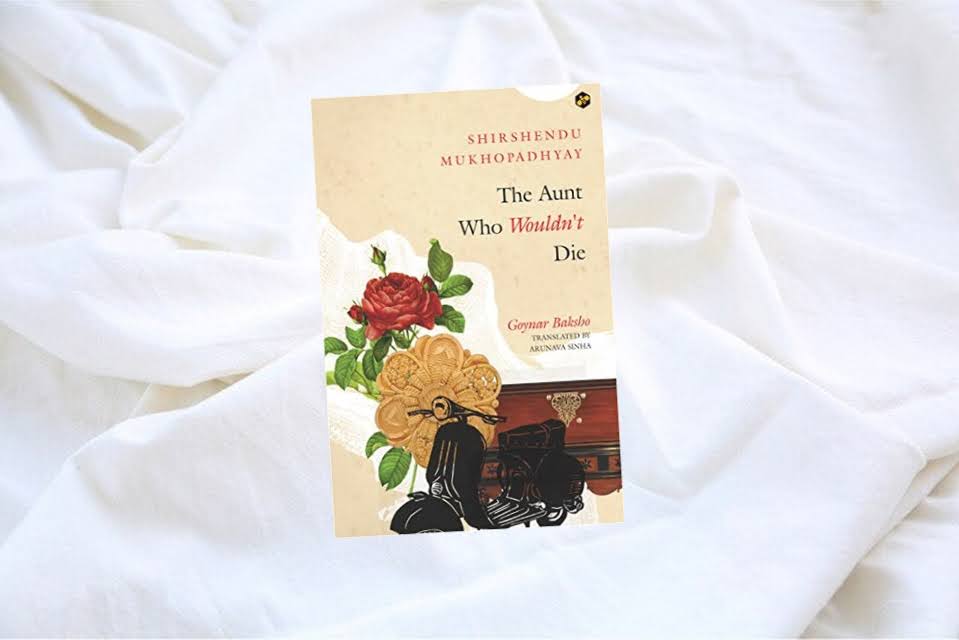The Aunt Who Wouldn’t Die by Shirshendu Mukhopadhyay (Author), Arunava Sinha (Translator)
Publisher: BEE Books
Pages: 143
Price: Rs. 320 INR(Kindle Edition)
ISBN: 978–9380925677
Buy here: https://amzn.to/2x1YnfS
A laugh-out-loud, tug-at-your-heartstrings tale of love, family, and freedom centered around three generations of Bengali women.
Somlata has just married into the dynastic but declining Mitra family. At eighteen, she expects to settle into her role as a devout wife in this traditional, multi-generational family. But then Somlata, wandering the halls of the grand, decaying Mitra mansion, stumbles upon the body of her great aunt-in-law, Pishima.
A child bride widowed at twelve, Pishima has finally passed away at the ripe old age of seventy. But she isn’t letting go just yet. Pishima has long harbored a grudge against the Mitras for keeping her in perpetual widowhood, never allowed to fall in love.. Now, her ghost intends to meddle in their lives, making as much mischief as possible. Pishima gives Somlata the keys to her mysterious box of gold to keep it out of the Mitras’ hands. However, the selfless Somlata, witnessing her new family waste away their wealth to the brink of bankruptcy, has her own ideas.
Boshon is a book-loving, scooter-riding, rebellious teenager who wants nothing to do with the many suitors that ask for her hand. She yearns for freedom and wants to go to college. But when her poor neighbor returns from America she finds herself falling in love. Perhaps Pishima’s yearning spirit lives on in her own her heart?
The Aunt Who Wouldn’t Die is a frenetic, funny, and fresh novel about three generations of Mitra women who are surprising at every turn and defy all expectations. They may be guarding a box of gold, but they are the true treasures in this gem of a novel.
About the author:
Shirshendu Mukhopadhyay is a famous Bengali author from India. He has written stories for both adults and children.He is known for creating the relatively new fictional sleuths Barodacharan, Fatik and Shabor Dasgupta.
About the translator:
Arunava Sinha is a translator from India. He translates classic, modern, and contemporary Bengali fiction and nonfiction into English. Thirty of his translations have been published so far. Twice the winner of the Crossword translation award, for Sankar’s Chowringhee (2007) and Anita Agnihotri’s Seventeen (2011), respectively, and the winner of the Muse India translation award (2013) for Buddhadeva Bose’s When The Time Is Right, he has also been shortlisted for the Independent Foreign Fiction prize (2009) in the UK for his translation of Chowringhee. Besides India, his translations have been published in the UK and the US in English, and in several European and Asian countries through further translation. He was born and grew up in Kolkata, and lives and writes in New Delhi.
My take on the book:
Somlata is married into an aristocratic Bengali family to a man much elder to her, where the men never bothered to pursue any profession or activity to earn money. The family had been eating off their jewelry reserves or by selling ancestral lands. Somlatha is handed over a huge jewelry box by her father-in-law’s sister, her Pishima, just before she passed away. Soon Somlatha starts seeing images of Pishima’s ghost which keeps tagging along her day and night. Boshon is a modern-day rebel who is a complete contrast to her mother Somlatha, while Latha believes Pishima took rebirth as her daughter Boshon. The Aunt Who Wouldn’t Die is the story of these three generations of women from the same household, their lives, their emotions, of love and pain.
The story starts with giving a glimpse of how life used to be a century ago, how Somlatha starts off as a timid young teenager from an economically backward background when compared to her husband’s princely family but turns life around for herself and her in-laws with her patience and conviction. Somlatha is magically supported by Pishima’s spirit who advices and educates her more than scaring her. The story picks pace once Pishima starts stalking Somlatha and her conversations are hilarious while teaching Somlatha life lessons.
The author brings about the contrast between the three women in a remarkable way, while highlighting how each of them are unique in their own way. Boshon is equally charming as her mother though a complete contrast. The translation is wonderful and helps retain the flavor of the original Bengali household. The author uses even the slightest details to describe these women, involving even the palatial house they reside as a prop for their emotions. The crucial elements of the story are smartly placed in the book cover.
Whether it is the unfulfilled desires of Pishima, a child widow who was never treated as a woman of blood and flesh by her family, or Somlatha’s fidelity to her husband or Boshon’s silent love for her neighbor, the story is an impressive commentary of women across generations. A vintage story which is entertaining with a message, this one is a must read.
My rating:
5/5.
